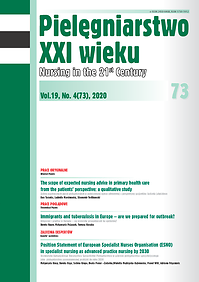Position Statement of the European Specialist Nurses Organisation (ESNO) in specialist nursing as advanced practice nursing towards 2030
DOI:
https://doi.org/10.2478/pielxxiw-2020-0032Keywords:
advanced practice nursing, European Specialist Nurses Organisation (ESNO), nurse educationAbstract
POSITION STATEMENT OF THE EUROPEAN SPECIALIST NURSES ORGANISATION (ESNO) IN SPECIALIST NURSING AS ADVANCED PRACTICE NURSING TOWARDS 2030
Introduction. The nursing profession in Poland is subject to continuous transformations, but it should follow the directions based on the common framework for the development of specialist nursing, drawn up by international specialist nurses associations in Europe. A change in the nursing education system in Poland has provided an opportunity for progress based on consistent framework.
Summary. Nurse education organised in a system of fi rst cycle and second cycle university courses was a milestone towards improving the status of the nursing profession. The improved position of Polish nurses paved the way for further advancements in this profession and in the related scientifi c research, which in the past was rarely conducted by Polish nurses; today more and more research teams are launched and operate both at universities and in nurses’ scientific associations.
References
1. Belowska J, Panczyk M, Zarzeka A, i wsp. Staż pracy a wiedza i postawy personelu pielęgniarskiego przystępującego do egzaminów specjalizacyjnych, organizowanych przez Centrum Kształcenia Podyplomowego Pielęgniarek i Położnych, wobec Evidence-Based Practice [Work experience and knowledge and attitudes of nurses taking state examinations organized by the Centre of Postgraduate Education for Nurses and Midwives with respect to Evidence-Based Practice]. Pielęgniarstwo Polskie. 2016;3(61): 340-346.
2. Ozga D, Jędrzejczyk-Cwanek M, Woźniak K, et al. Knowledge, Behaviors, and Attitudes of Polish Nurses as Compared with Evidence-Based Practice in Relation to the Guidelines of the European Resuscitation Council. Global Advances in Health and Medicine, 2019. https://doi.org/10.1177/2164956119897566
3. Gotlib J, Belowska J, Panczyk M, i wsp. Evidence-Based Medicine and Evidence- Based Nursing Practice – Przegląd Polskiego piśmiennictwa naukowego [Evidence- Based Medicine and Evidence-Based Nursing Practice – a review of the Polish scientific literature]. Problemy Pielęgniarstwa. 2014, 22(2): 223-227.
4. https://www.esno.org/assets/esno_position_statement_april_2019_final.pdf (Accessed 20 March 2020).
5. Brown B. Odwaga w przywództwie. Cztery kompetencje autentycznego lidera [Dare to Lead: Brave Work. Tough Conversations. Whole Hearts]. Wydawnictwo MT Biznes; 2019.
6. Knap M. Ocena poziomu natężenia i terapia bólu - zadanie zawodowe profesjonalnie przygotowanych pielęgniarek [Assessment of pain intensity and therapy – work duties of professional nurses]. Nowe trendy w edukacji i praktyce pracowników ochrony zdrowia. Profesjonalizm kluczem do bezpieczeństwa pacjenta [New trends in education and practice of healthcare workers. Professionalism as a key to patients’ safety]. Ostrowiec Świętokrzyski. 2018; 6: 243-255.
Downloads
Published
Issue
Section
License
Copyright (c) 2020 Authors

This work is licensed under a Creative Commons Attribution-NonCommercial-NoDerivatives 3.0 Unported License.




